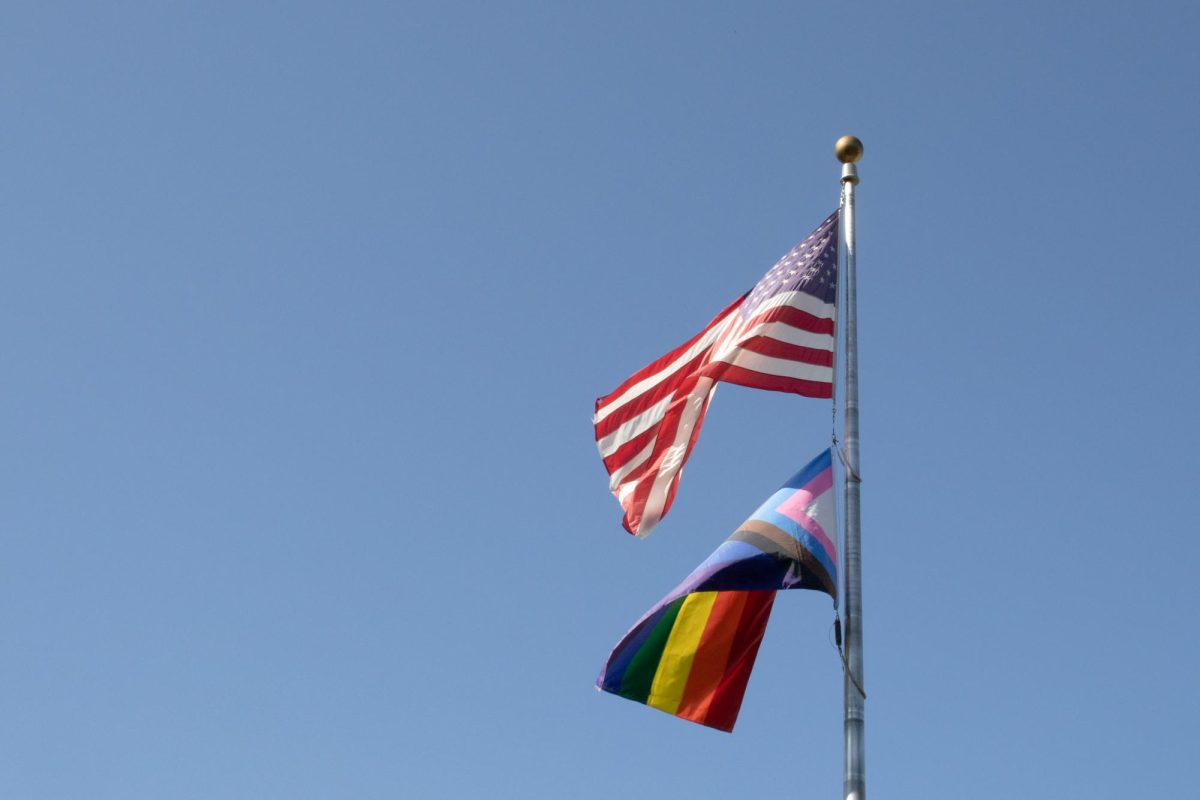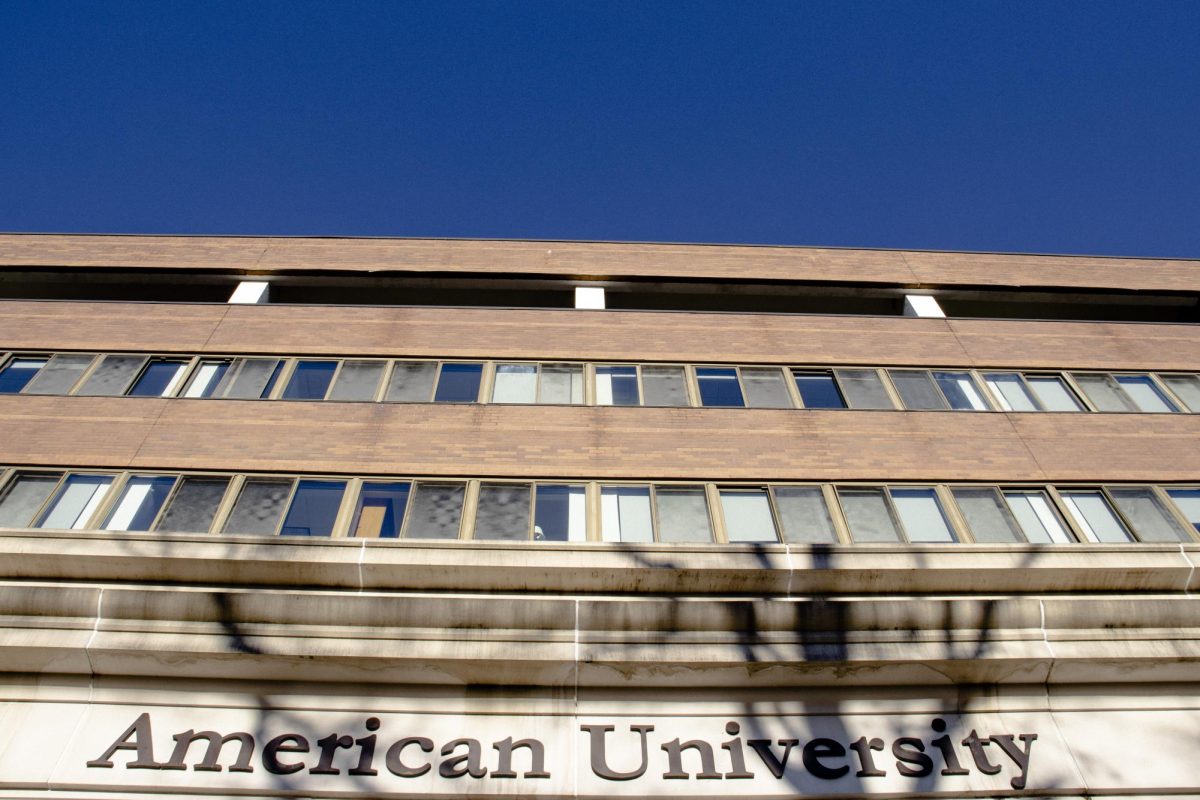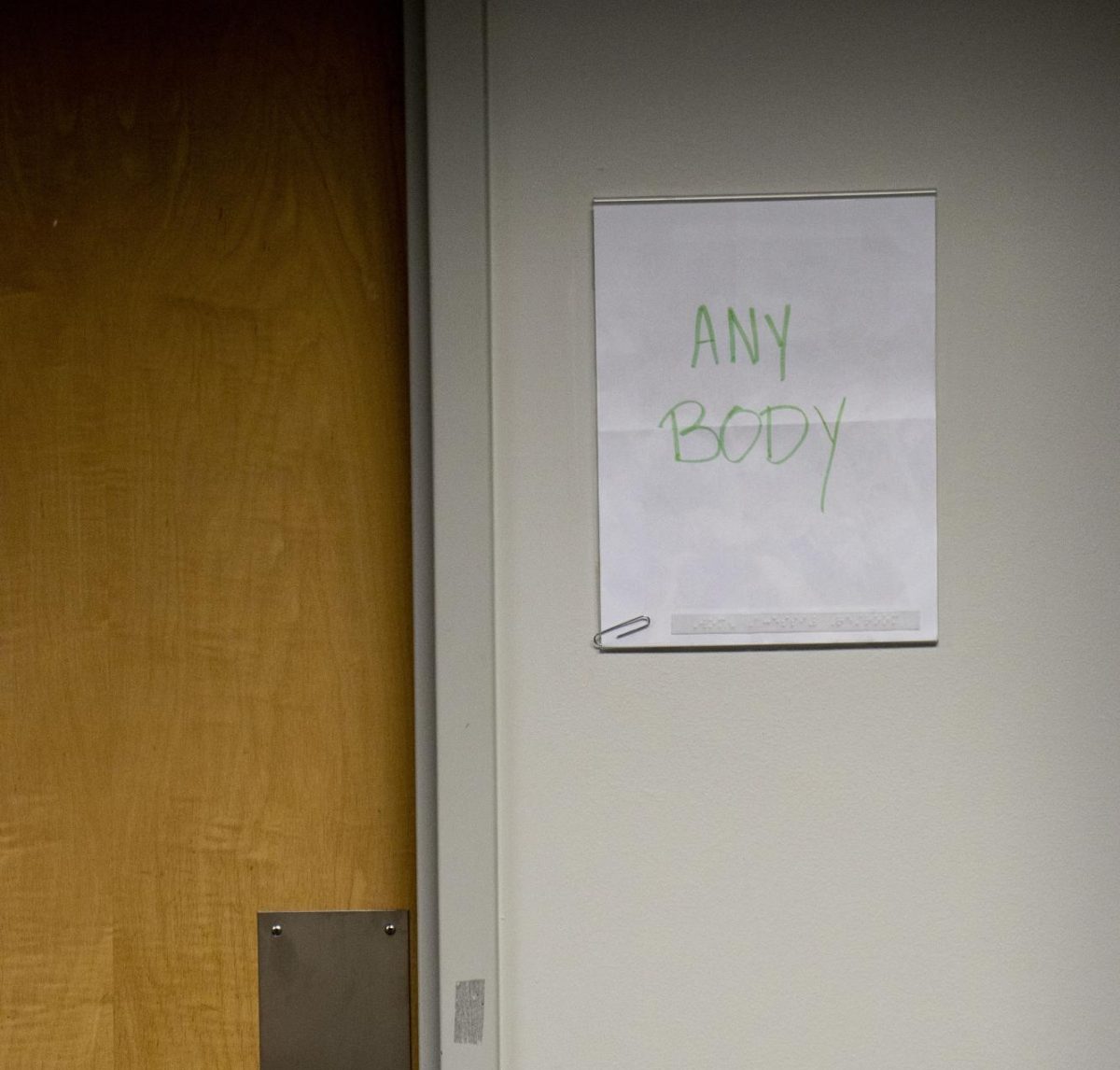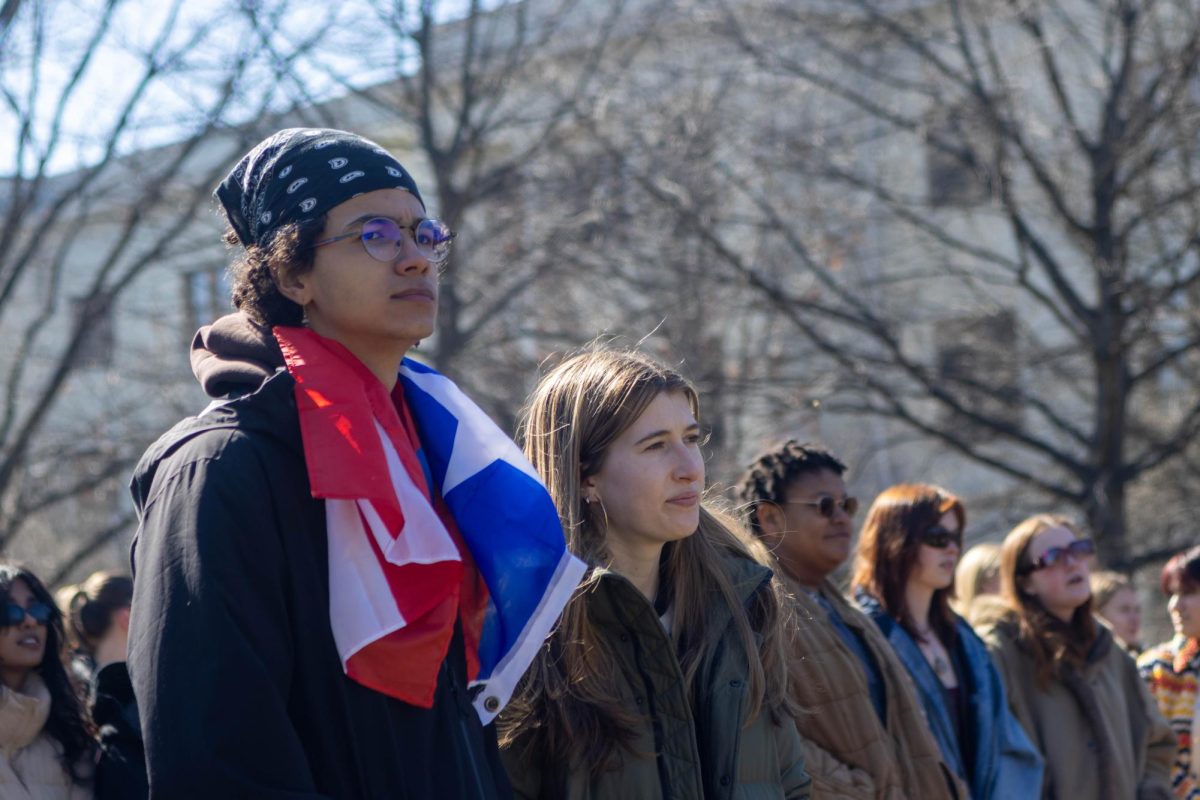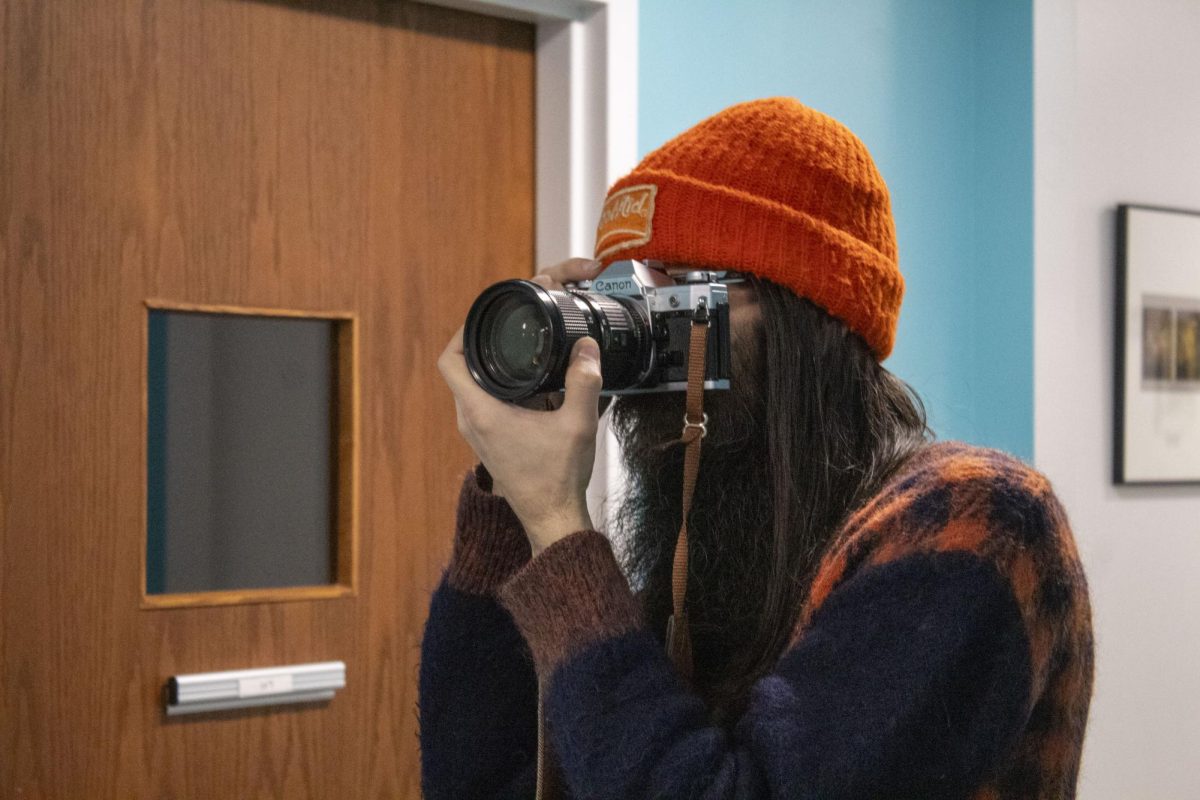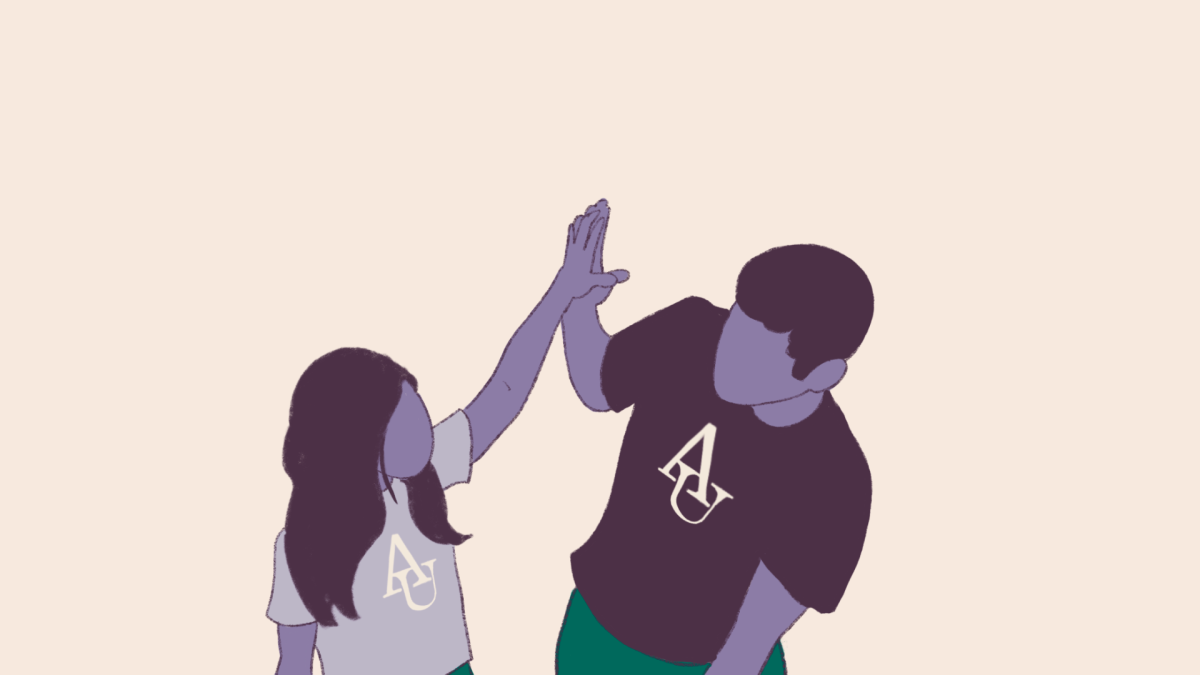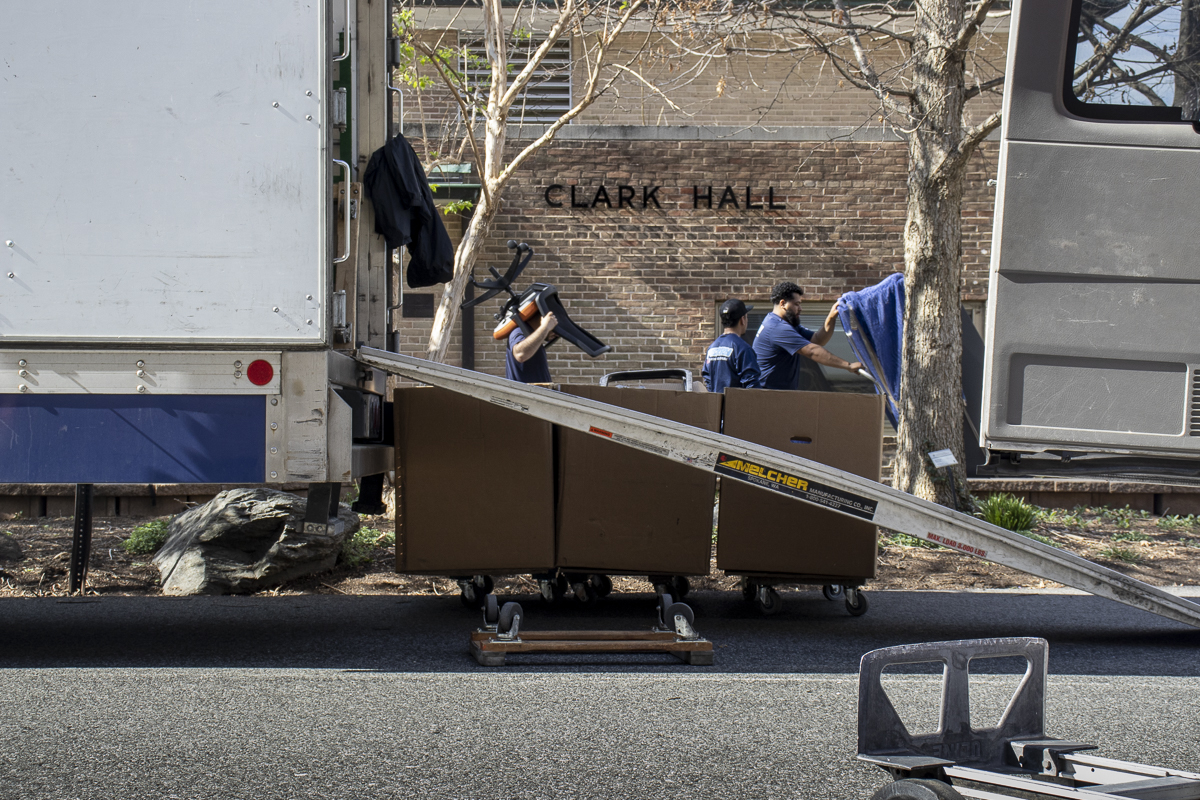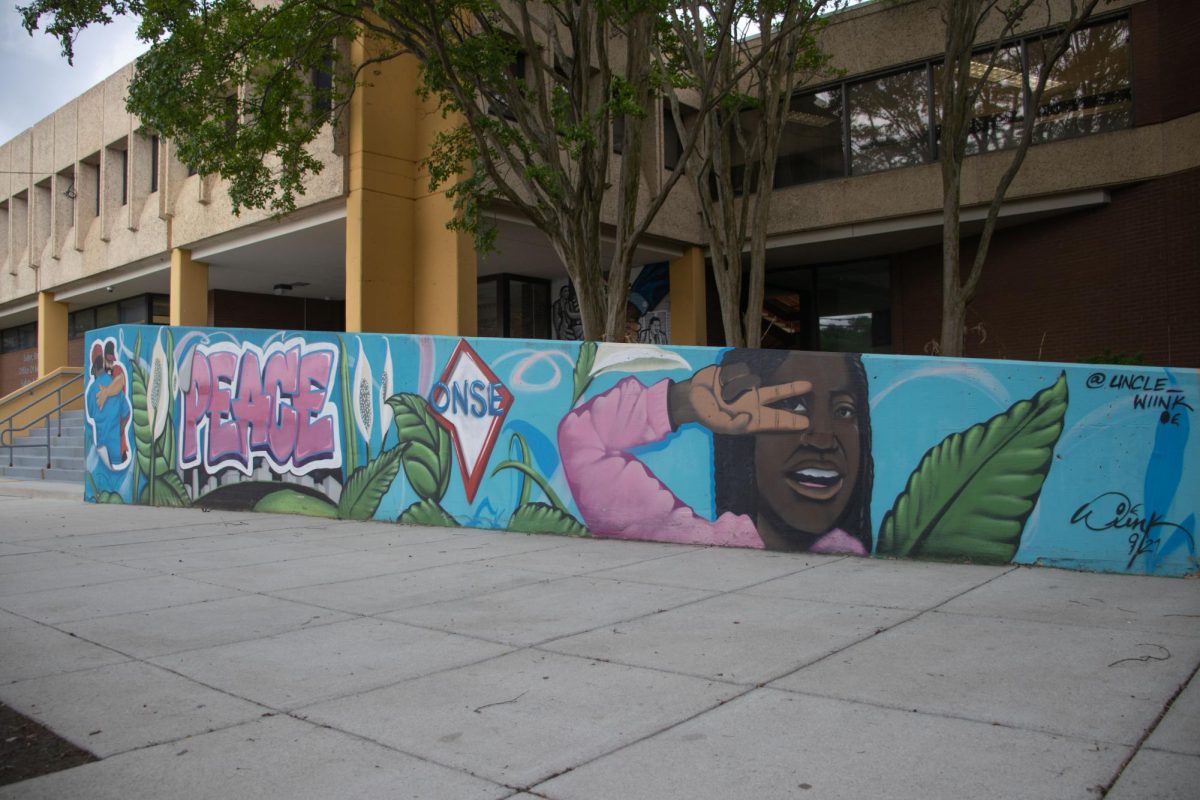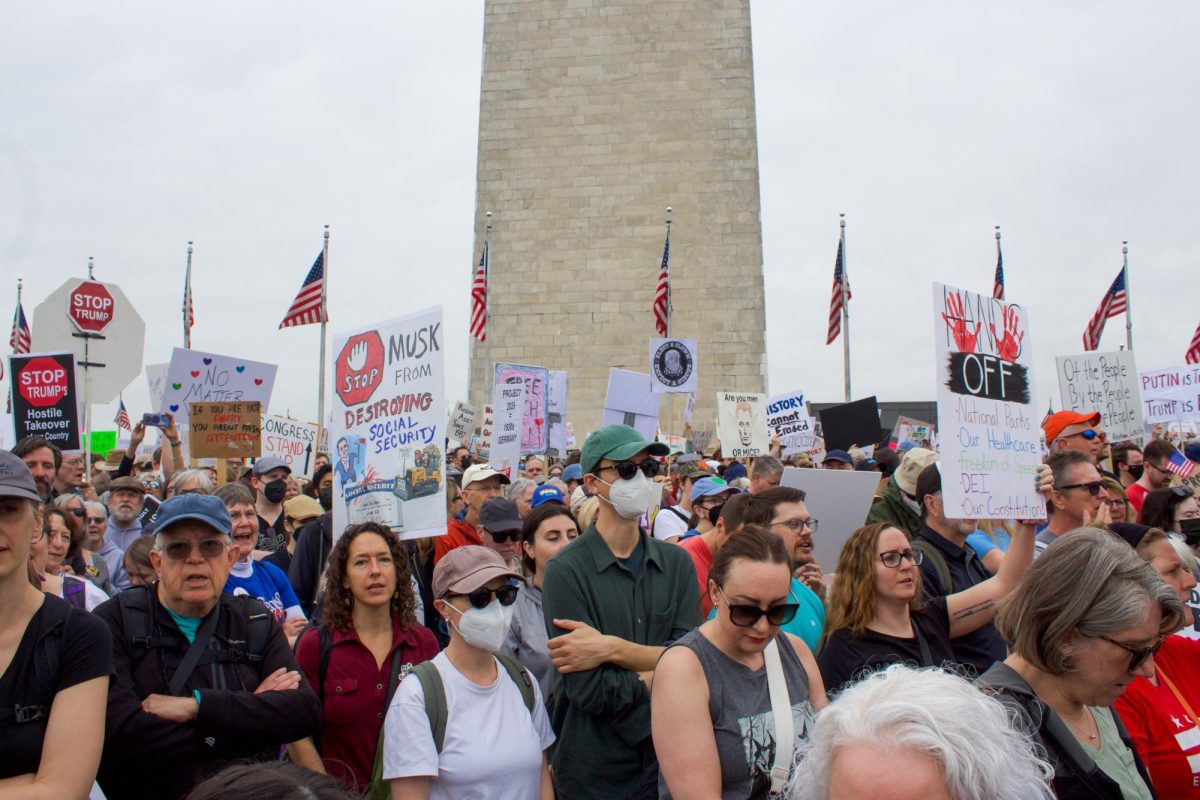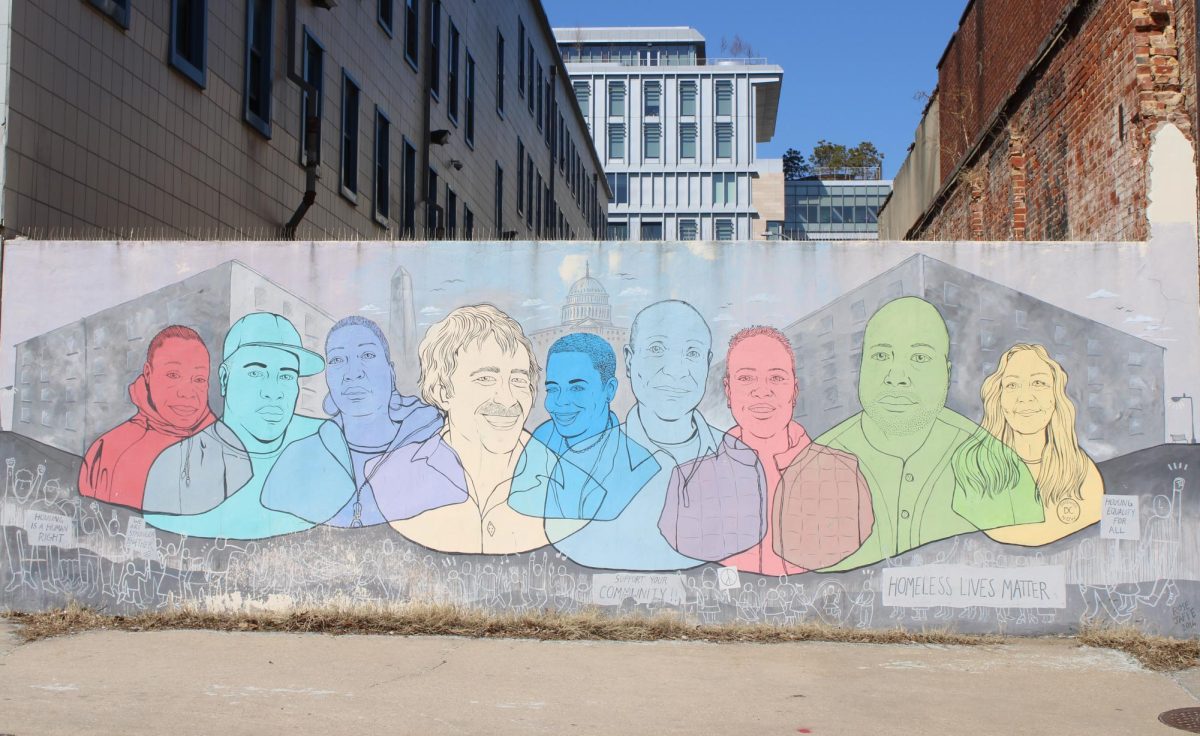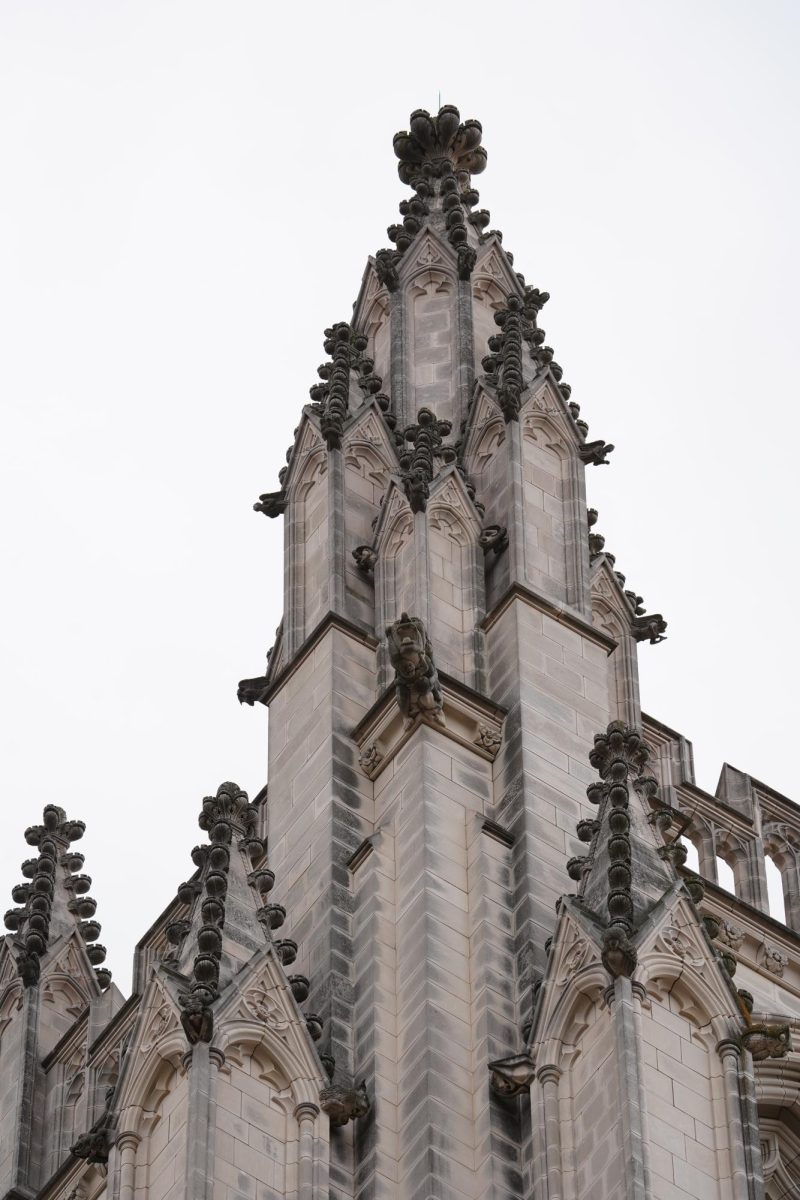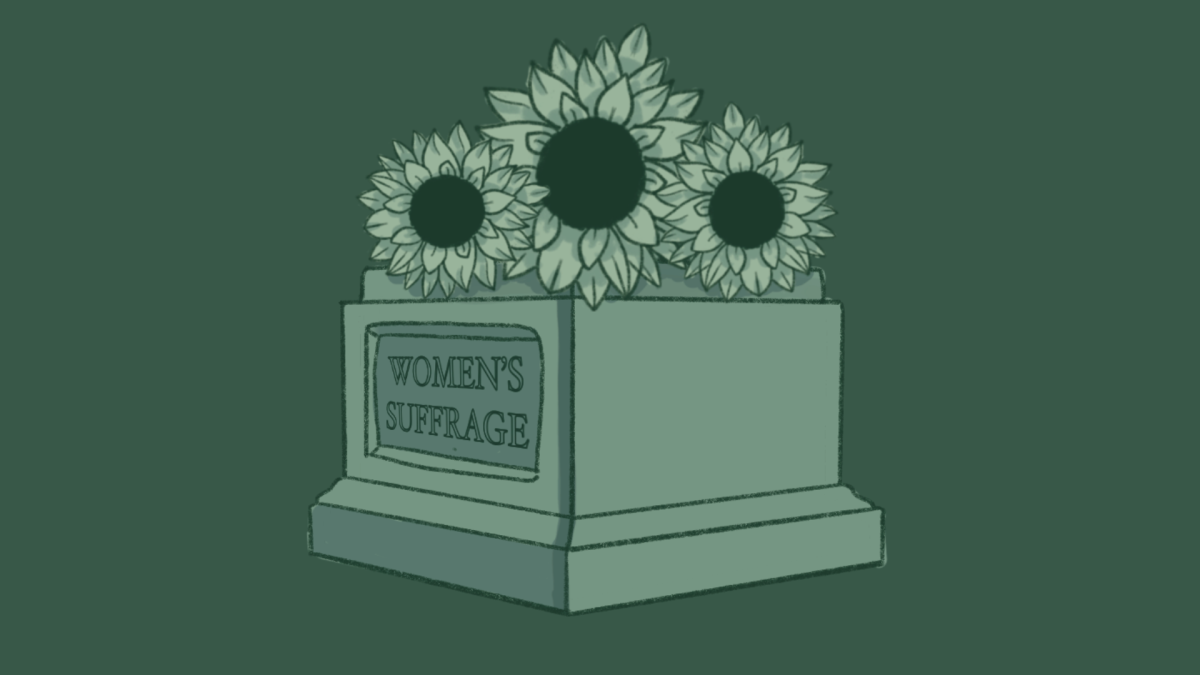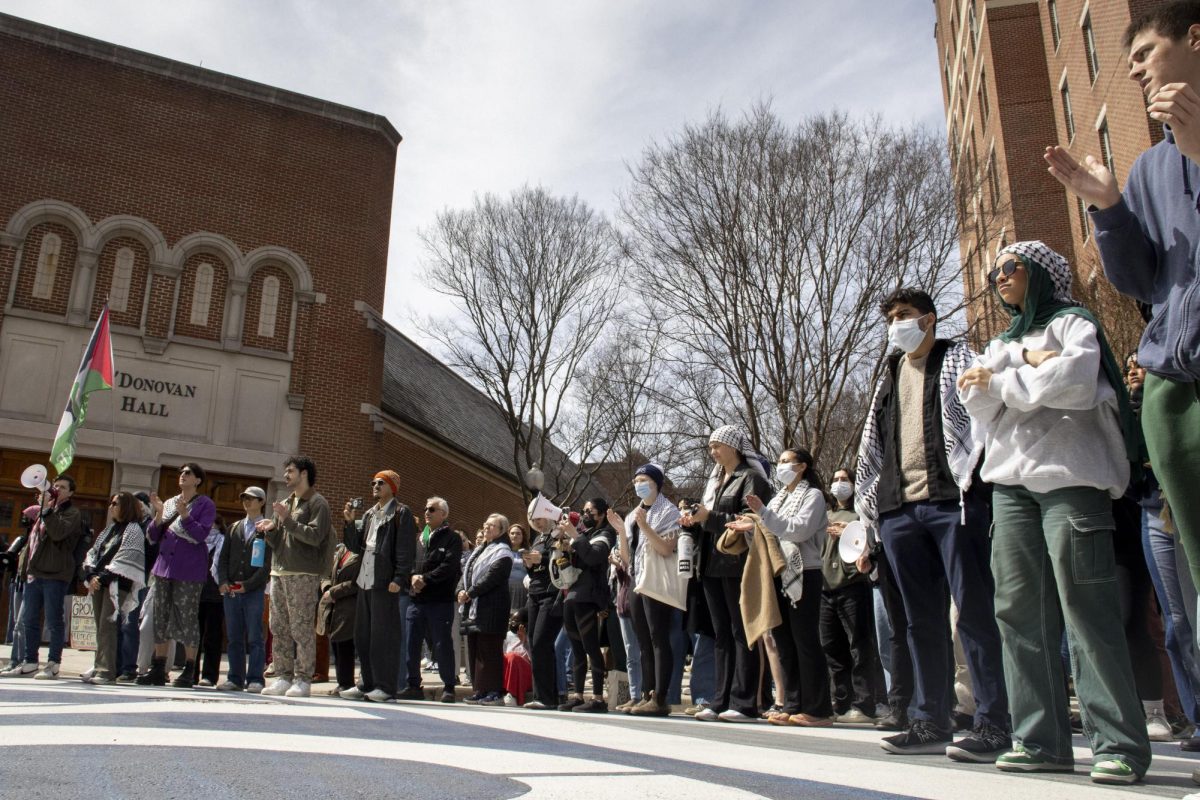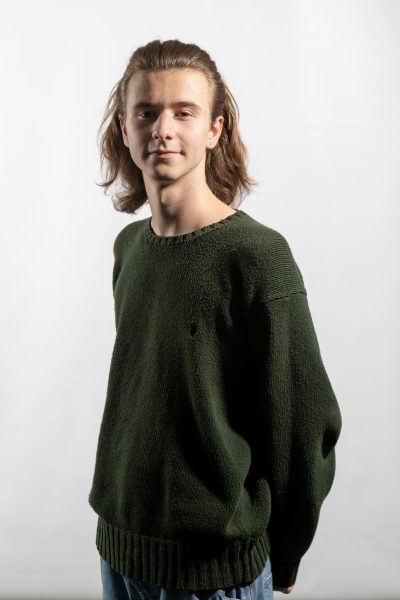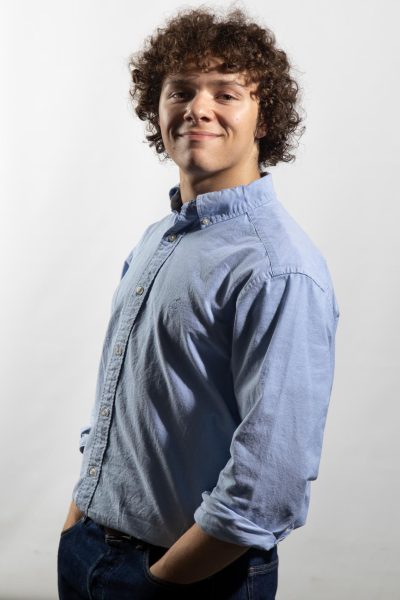Content Warning: This article describes suicide and violence against transgender people.
When Gabe Michelangelo was weighing which colleges to apply to, his transgender identity was one of the biggest factors.
The day Michelangelo toured American University, he said the environment felt welcoming. Had the campus atmosphere felt less queer-friendly, he said he may not have even applied. But he saw a lot of queer people around campus, and spotted AU Pride tabling on the quad.
“It made me feel like it was a place that I could belong,” Michelangelo said in a message to AWOL.
Belonging is not always the status quo, as hate crimes affecting trans students have occurred across the United States. According to hate crime reports published by the FBI from 2016 through 2019, schools and colleges were consistently the third most common location for gender identity-based hate crimes.
In 2019, 7.1% of hate crimes on the basis of gender identity took place at schools and colleges, according to the FBI’s last published report.
As the number of hate crimes against trans people — particularly trans women of color — have risen across the United States according to the Human Rights Campaign, some members of AU’s trans community have reported feeling safe on campus. But students have still reported feeling affected by the news of these crimes.
On Feb. 25, members of the AU community gathered for a vigil hosted by Equality Onward AU to remember Nex Benedict. Benedict, a 16-year-old high school student, was assaulted in an Oklahoma school bathroom and died by suicide a day later, according to a statement by Owasso police and a coronary report.
Michelangelo said he was saddened after hearing about Benedict’s death. He said Benedict’s age especially struck him. While Michelangelo said the incident didn’t make him question his own safety, he said he felt Benedict had barely gotten to live their life.
“I’m lucky as a trans person,” Michelangelo said. “But there are a lot of people who aren’t.”
Recent attacks on trans people have also occurred in Washington, D.C. On Oct. 14, 2023, 30-year-old A’nee Roberson was hit by a car on U Street after being assaulted, according to a report by the Metropolitan Police Department.
Roberson’s death was the second reported killing of a Black trans woman in the district in 2023. Earlier that year, on Jan. 7, Jasmine “Star” Mack was stabbed to death on Gallaudet Street in the district’s northeast quadrant, according to an MPD report which refers to Mack by her deadname.
Eight months later, justice has yet to be served for Mack’s death, said Iya Dammons, a trans activist and the executive director of D.C. Safe Haven, a non-profit that provides health and safety resources to queer and trans people in Washington and Maryland. Roberson’s death also remains unsolved, along with the deaths of five other trans people dating back to 2000, according to MPD’s “Open or Unsolved Transgender Homicides” page.
Dammons said trans people across the district are still at risk of violence.
“The violence is extremely crazy in Washington, D.C.,” Dammons said.
In 2023, there were 15 reported hate crimes in the district related to victims’ gender identity and expression, according to MPD’s Bias-Related Crimes Data. Those do not include Robertson’s or Star’s deaths. Three occurred within the Police Department’s 2nd District, which includes AU. In 2024, there have already been 16 reported incidents across Washington.
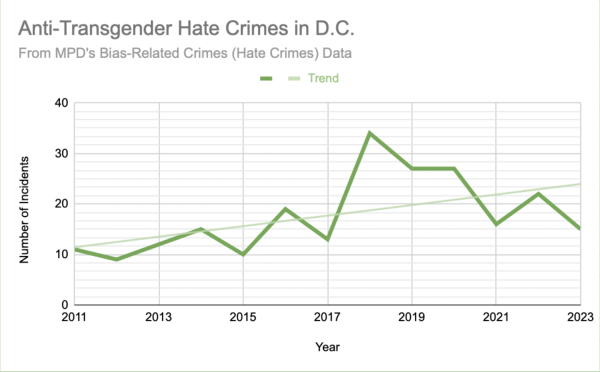
At AU, recent announcements from administrators have caused safety concerns among some trans students.
Radha, a recent AU alumna and trans woman who preferred her last name not be printed for privacy concerns, said she worries AU will increase police security in response to conversations about trans safety. She said increased police presence is not the solution.
“I think that having more security or police presence on campus would only hurt trans people, and especially trans people of color,” Radha said. “If anything, there should be less of a presence.”
In October 2023, AU began its periodical review of safety infrastructure and practices, according to an Oct. 4 email sent by Bronté Burleigh-Jones, AU’s chief financial officer. The review included consideration of arming campus police officers with lethal weapons, but the email did not explicitly mention any increase in police presence.
Radha said AUPD’s presence has made her queer and trans peers uncomfortable. She said hearing about a student being forcefully seized from her dorm room in 2019 contributed to her discomfort with police presence on campus. Though the student did not publicly identify as trans, Radha said her concern was broader than the student’s gender identity.
“I would hate for that to be done in the name of quote-unquote protecting trans people,” she said.
AU’s internal communications office did not comment in time for publication.
Henry Jeanneret, a recent alumnus and trans man, said the notion of safety has been weaponized, often by white people. He said it has hurt marginalized people, including trans people.
Jeanneret said attempts to arm campus police are an example of weaponizing safety.
No decision has been made on this matter, according to the Oct. 4 email. Elizabeth Deal, assistant vice president for community and internal communication, said a working group created to inform on the question of arming AUPD will hold educational sessions this fall.
Off campus, Radha said there have been times where she has felt unsafe. She said a hate incident that occurred on a metro train made her feel uncomfortable riding public transportation.
Saoirse Graves Gowan, the victim of the hate incident, posted to the social platform X on April 9, 2022 that she was verbally assaulted on the metro. The video accompanying her post shows a man filming, repeatedly misgendering her and yelling obscenities at her. He accused her of grooming children, according to the post.
Radha said the incident worried her and others who ride the metro alone.
“I think I definitely have a fear of going out. But I think that I kind of have to tone that down in my mind,” Radha said. “I genuinely do believe that there are a lot of people who, if something were to happen, would try to help because I think that I’ve just seen that in D.C. — I’ve seen a lot of people stand up for people.”
Radha said she doesn’t think incidents like these necessarily render Washington unsafe for trans people. She said it’s a problem with the country, not the city.
Jeanneret said the rise in hate crimes against trans people can be attributed to the rise in anti-trans rhetoric. This has been accompanied by legislative attacks on trans people through gender-affirming care bans, drag bans and bills barring trans people from using bathrooms that align with their identity, he said.
As of Aug. 10, legislators across the country have introduced 638 bills targeting trans people in 2024. In 2023, 609 anti-trans bills were considered in state legislatures, more than triple the 174 considered in the previous year. In 2021, 155 anti-bills were introduced, according to the Trans Legislation Tracker.
“We’re seeing the rise in hate crimes because of how we’re seeing the rise of anti-trans legislation and this rhetoric that is framing transgender people as groomers and that is framing transgender children as deviant,” Jeanneret said.
Aarushi Sahejpal, a professorial lecturer in the School of Communication and a trans man, said trans students are bearing the brunt of hate crimes and anti-trans legislation. He said he couldn’t read the news about Nex Benedict’s death.
“If I can’t even read a news article — and I’m a journalism professor — because it makes me so distraught, I can’t even imagine and fathom what it’s like for a student to live in this day and age,” Sahejpal said.
Sahejpal said the university’s administrators may be unaware of how much of an effect current events have on trans students — it’s not always obvious. He said he recommends mental health support and check-ins.
Khouri Lassiter, assistant director for LGBTQIA+ education and support programs at AU, said they interact with trans students every day.
Lassiter said trans and non-binary students experienced a lot of grief after the passing of Nex Benedict but wanted to prevent anti-trans incidents on campus.
“The thing that really does give me hope is that students are like, ‘Okay, what can we do now?’” Lassiter said.
Radha said AU administrators can materially help trans people by adding more gender neutral bathrooms and gender neutral locker rooms.
Meanwhile, Dammons said universities can protect their trans students by ensuring they “come down hard” on hate crimes against trans students and creating an affirming space on campus.
Trans-inclusive policy has been in the works at AU for over two decades. In February 2022, Perry Zurn, provost associate professor in the department of philosophy and religion, and four master’s students created “The AU Trans Experience: Then and Now,” a website documenting the history of trans people’s experiences at AU dating back to 1971.
The project aimed to provide trans students a sense that they belong to a trans-affirming community and a history of trans people at AU, according to the website’s description. Its work shows the beginning of a set of policies which began the practice of trans inclusivity at AU.
According to the website, students Mindy Michels and Caeden Dempsey sent a report to AU administrators in June 2001 entitled “Admin Support of Trans Students and Faculty.” The report called for trans-inclusive housing policies, single-occupancy bathrooms and restroom inclusivity, the designation of two trained staff members to work with trans people on campus and inclusion of gender identity and expression in the university’s non-discrimination policy, according to AU’s digital archive.
It also called upon the university administration to issue a promise of support for trans students and staff members. And it asked the university to commit to maintaining equal access to all university opportunities.
The following February, AU’s senior officers agreed to include at least one single-stall restroom in each building constructed or renovated thereafter, according to a memo sent by then-Vice President Gail Hanson.
According to the memo, the university had “no good alternatives” for gender neutral locker rooms. Hanson recommended converting two single-stall restrooms in Butler Pavilion into unisex bathrooms and proposed altering one into a private changing area and shower.
AU administrators also included gender identity and expression in the university’s non-discrimination policies in June 2002, according to AU’s Trans Resource Guide, thereby following through with another of the report’s requests to support trans students.
AU was within the first dozen colleges in the United States to include such policies, according to the resource guide.
The university also created a role in the Center of Diversity and Inclusion designated to assist LGBTQ+ students, hiring Khouri Lassiter in 2022.
And today, students and professors at AU are supportive of trans people, according to Radha. Yet, at the administrative level, she still sees room for improvement.
“I think that it is a great space,” she said. “I just think that from an administration perspective, doing stuff like taking away gender neutral bathrooms was kind of showing that they weren’t really in touch with what the actual people at AU wanted, at least that I was in community with.”
In December 2022, the university announced plans to eliminate 14 multi-stall gender neutral restrooms across campus. The plan, according to an email sent by Chief Financial Officer Bronté Burleigh-Jones on August 15, was proposed in accordance with district plumbing regulations and concerns about privacy.
In a Feb. 15, 2023, update, Burleigh-Jones announced that a working group of 15 faculty and administrators decided against redesignation after learning that a D.C. plumbing code modification does allow for multi-stall, all gender restrooms. These new guidelines prompted the university to commit to providing inclusive multi-stall restrooms in new building and renovation projects.
Jeanneret said the initial decision to redesignate restrooms was one of the most explicit examples of transphobia he’s seen on campus.
“I think it’s just a really blatant example of transphobia because it went back to this question of safety,” Jeanneret said. “They were concerned about the idea of safety. And the question is safety for whom? Because this is putting a lot of people in an unsafe situation.”
Deal said AU is dedicated to supporting its trans students through a variety of resources. In an email to AWOL, Deal cited the Center for Diversity and Inclusion’s LGBTQ+ affinity group workshops, the Trans Resource Guide, all-gender housing provided by Housing and Residence Life and the opportunity for housing accommodations through specialized requests.
Amanda Taylor, assistant vice president for diversity, equity and inclusion, said supporting AU’s trans and LGBTQ+ communities is central to the university’s work of inclusive excellence.
“We will continue our efforts to ensure that AU’s policies and practices, including ongoing implementation of AU’s Chosen Name and Gender Identity policy, provide opportunities for our AU community members to be recognized and engaged in ways that communicate mutual respect and advance a sense of belonging,” Taylor said in the same message sent to AWOL by Deal.
Though the changes to the restrooms were never completed, concerns about access to gender neutral spaces extend to gym locker rooms, too. Twenty-two years after the 2002 memo, there is still no alternative to gendered changing areas inside the university’s main athletic facility, Jacobs Fitness Center, according to the AU website.
“I didn’t take advantage of the gym because of that reason,” Radha said. “I was, and I still am, worried about something happening if I were to use the women’s locker room.”
The Cassell Fitness Center has gender-inclusive locker rooms, according to an email to AWOL by Jasmine Pelaez, who was AU’s internal communications manager at the time she sent the email.
“While we currently don’t have an all-gender locker room in Jacobs Fitness Center, there are all-gender restrooms available in the Sports Center for community members’ use,” Pelaez wrote in the email.
The Sports Center encompasses all of Jacobs, Bender Arena and Reeves Aquatic facilities. The restroom Pelaez referred to is located up the stairs from, rather than inside, Jacobs Fitness Center, according to AU’s all-gender restroom list.
In the upcoming Meltzer Center and Sports Center Annex, student athletes will have single-stall changing areas within gendered locker rooms specific to athletic teams, according to Deal.
None of the new locker rooms intended for AU athletes will be gender neutral, according to the documents published on AU’s website. Meltzer Center locker rooms will be designated for volleyball, wrestling and coaching staff, while SCAN locker rooms are intended for men’s and women’s basketball, according to a Jan. 26 presentation and the project’s application.
There will, however, be gender-inclusive restrooms throughout the Meltzer Center, according to the project’s zoning order.
Deal confirmed in an email to AWOL that locker rooms in Meltzer and SCAN will be gendered for varsity athletic teams. There will also be locker rooms designated as gender neutral, but these will be for visitors’ and officials’ use and will not be public, Deal said.
“We are expanding on this effort for every renovation project within the [Student Thriving Complex] to include all gender multi-stall restrooms,” Deal said in the same email.
Other universities, including Princeton, Berkeley, Iowa State University and University of Colorado Boulder, have designated all-gender locker rooms in their gyms.
Increasing access to gender neutral locker rooms would be a way for AU to put trans safety and inclusivity into action, Radha said. But she said AU’s administrative systems are not always as considerate of trans people as they could be. The lack of gender neutral locker rooms, she said, is an example.
“It’s just a thing in general, where administrative stuff is not really considering trans people as something that would come up,” Radha said.
Elliot Zeman, an upperclassman at AU, said he’s heard of instances at other universities where transphobia has appeared in classrooms and roommate situations have turned sour over one person’s trans identity. In terms of trans safety, AU is better than other universities, he said.
Zeman, a trans man and former president of the Beta Theta Pi fraternity, said his frat’s environment is very queer-friendly. He said his frat pushed at their national convention to make frats more inclusive.
Zeman said there were times he felt uncomfortable on campus, though, especially during inter-fraternity events. He said these spaces can sometimes feel hyper-masculine, featuring conversations that he could not relate to.
“I can just tell when a place would be easier to exist in as a trans person or not,” Zeman said.
Jeanneret also said he’s felt safe on campus.
“I’ve had people being ignorant, and I’ve had people not get it, but I haven’t had people being directly hostile toward me, which is a low bar,” Jeanneret said.
Though he said he’s felt safe, he said his privilege as a white, cisgender-passing man plays a great part in that. He came out as trans when he was 14-years-old and transitioned before coming to AU.
“I think if I were a person of color, if I were Black, if I were gender nonconforming, if I was not like super masc and binary it would be a different experience,” Jeannerette said.
Jeanneret said many of his friends are queer and trans. He also said he knows professors, one in particular, who he trusts and could turn to if he needed extra support. He said having trans and gender nonconforming professors has contributed to his support system.
Sahejpal said a student told him before the spring semester started that she had never had a trans or queer professor from her ethnic background before. He said he didn’t realize the impact of his identity on his teaching until students began to come to him for support.
“They see themselves and they feel comfortable to come and talk to me,” Sahejpal said.
Sahejpal, who earned his bachelor’s and master’s degrees at AU, said he’s seen queer and trans students band together in his time as a professor in a way that was harder for him when he was a student.
“I’m glad that there’s some sort of solidarity and there’s trust,” he said.
During his freshman year, Michelangelo said he surrounded himself with friends who were also trans. Having people to talk to who share similar experiences has been a support system for him, he said.
“I always felt safe with that community,” Michelangelo said.
Radha said student culture has felt supportive, but there’s more to be done.
“I think there’s a culture of sharing your pronouns,” Radha said. “I think there’s a culture of at least using the words to be inclusive of trans people. And that trickles down into students interpersonally being supportive of trans people.”


